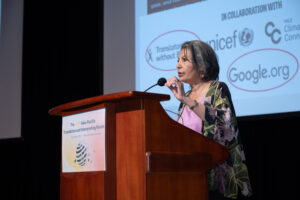Activism and Volunteerism in Translation: A Critical Reappraisal

Mona Baker Keynote at 11th Asia-Pacific Translation and Interpreting Forum 2025
Abstract Much has been written about activist and volunteer groups of translators and interpreters who have played an important role in promoting a variety of political agendas, at least since the rise of the global justice movement at the beginning of this century. But we are now witnessing an explosion in the number of such groups, with many focusing on specific issues, most notably the environment, migration, and violent conflict, which are the big issues of our time. With the proliferation of such initiatives, and the increasing number of volunteers they attract, it is vital that we look more closely at the nature of their practices, and in particular on whether and how they might wittingly or unwittingly be entrenching epistemic territorial practices typical of colonial and neoliberal approaches to knowledge. Translation has the potential to play a transformative role in reconfiguring social and political relations by articulating new forms of knowledge through the responsible confrontation of diverse epistemologies and cultural experiences. At the same time, translational encounters, even when well intentioned, can be exploitative, manipulative, and can reinforce rather than challenge structures of power. I will argue that this latter pattern of encounter through translation is increasingly and worryingly evident in the work of a growing number of ‘activist’ groups that claim to offer volunteer translation to spread purportedly progressive ideas and support marginalized communities. Some of these groups adopt discourses of globalization, development, human rights, diversity and mutual understanding that mask aggressive processes of homogenization, exclusion and co-optation. Building on earlier studies of activist communities of translation and interpreting, by myself and others, I will offer an updated critical analysis of the political positioning and language policies of a number of recently founded groups of volunteer translators and interpreters. With some exceptions, much of the work of these (often well intentioned) groups will be shown to perpetuate epistemic injustice and reinforce existing social and political inequalities.
About the speaker
Mona Baker is Affiliate Professor at the Centre for Sustainable Health Education (SHE), University of Oslo, where she is responsible for developing the Sustainability & Health Corpus, co-coordinator of the Genealogies of Knowledge Research Network, and Honorary Dean of the Graduate School of Translation & Interpreting at Beijing Foreign Studies University. She is author of In Other Words: A Coursebook on Translation and Translation and Conflict: A Narrative Account; co-author (with Eivind Engebretsen) of Rethinking Evidence in the Time of Pandemics; editor of Translating Dissent: Voices from and with the Egyptian Revolution (winner of the 2016 Intranews Linguist of the Year Award) and Unsettling Translation: Studies in Honour of Theo Hermans; and co-editor of the Routledge Encyclopedia of Translation Studies and the Routledge Encyclopedia of Citizen Media. She is also founding co-editor of the new Diamond Open Access journal Encounters in Translation. Her articles have appeared in a wide range of international journals, including Humanities and Social Sciences Communications; Medicine, Health Care and Philosophy; Social Movement Studies; Critical Studies on Terrorism; Social Semiotics; Target and The Translator. She posts on translation, citizen media and Palestine on her personal website and tweets at @MonaBaker11.
Date: 22 May 2025